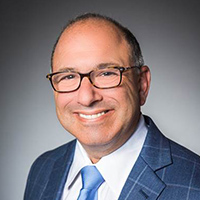Six Reasons You May Need More Than A Robo-Adviser
Have you ever sat down and discussed your hopes and dreams with a computer? There are some things that algorithms just can’t do.


Profit and prosper with the best of Kiplinger's advice on investing, taxes, retirement, personal finance and much more. Delivered daily. Enter your email in the box and click Sign Me Up.
You are now subscribed
Your newsletter sign-up was successful
Want to add more newsletters?

Delivered daily
Kiplinger Today
Profit and prosper with the best of Kiplinger's advice on investing, taxes, retirement, personal finance and much more delivered daily. Smart money moves start here.

Sent five days a week
Kiplinger A Step Ahead
Get practical help to make better financial decisions in your everyday life, from spending to savings on top deals.

Delivered daily
Kiplinger Closing Bell
Get today's biggest financial and investing headlines delivered to your inbox every day the U.S. stock market is open.

Sent twice a week
Kiplinger Adviser Intel
Financial pros across the country share best practices and fresh tactics to preserve and grow your wealth.

Delivered weekly
Kiplinger Tax Tips
Trim your federal and state tax bills with practical tax-planning and tax-cutting strategies.

Sent twice a week
Kiplinger Retirement Tips
Your twice-a-week guide to planning and enjoying a financially secure and richly rewarding retirement

Sent bimonthly.
Kiplinger Adviser Angle
Insights for advisers, wealth managers and other financial professionals.

Sent twice a week
Kiplinger Investing Weekly
Your twice-a-week roundup of promising stocks, funds, companies and industries you should consider, ones you should avoid, and why.

Sent weekly for six weeks
Kiplinger Invest for Retirement
Your step-by-step six-part series on how to invest for retirement, from devising a successful strategy to exactly which investments to choose.
The new trend in the financial advice business is the rise of the so-called robo-adviser. These are online investing platforms that use computer-generated algorithms (programs, apps, etc.) to create financial strategies and manage your money.
The attraction of these programs is that they are very low cost, don’t ask very hard questions about your finances, and are simple to use. For people in their 20s, who are making their initial investments and don’t have much saved yet, a robo-adviser might work.
So, why do you need a “real life” financial adviser? There are plenty of reasons, actually.
From just $107.88 $24.99 for Kiplinger Personal Finance
Become a smarter, better informed investor. Subscribe from just $107.88 $24.99, plus get up to 4 Special Issues

Sign up for Kiplinger’s Free Newsletters
Profit and prosper with the best of expert advice on investing, taxes, retirement, personal finance and more - straight to your e-mail.
Profit and prosper with the best of expert advice - straight to your e-mail.
1. They know their clients.
This is a core principle of the financial industry and the legal and regulatory system overseeing all financial advisers, brokers and investment professionals. How well can a computer program really know you? To a computer, everything is either a 1 or a 0. All computers work that way. Can you really reduce your life, your future, your dreams into a series of 1s and 0s?
2. Life happens.
“Real life” financial advisers should provide more than just a financial strategy. Most advisers understand there are things outside our control and, as time passes, our lives change, with good and bad things happening. When crises occur — personal tragedies, hurricanes and other natural devastation — many advisers spend long hours working with clients to get their lives back to normal and helping them figure out how to protect their future. Can a computer do this?
3. Accountability.
Everyone has different purposes for their money. Everyone has different investment needs. Advisers can help you define your wealth strategies and hold you accountable to the strategies you create together. Robo-advisers are designed around simple variables like age, target retirement date, risk tolerance and income level. A computer doesn’t care if you reach your goals.
4. Taxes, taxes and more taxes.
Most retirees have the majority of their money in tax-deferred accounts (401(k)s, IRAs, 403(b)s, etc.). The wrong financial move can create unnecessary tax costs, pulling hard-earned dollars from your portfolio. Robo-adviser platforms are generally only designed to handle portfolio management. They usually are not equipped to offer tax-efficient strategies, nor do they take into consideration insurance, health care or real estate in their automated calculations.
5. Life is about more than investing.
Financial advisers help you prepare for all of life’s important financial milestones: buying a house, paying off debt, funding college, fulfilling a bucket list, taking vacations as well as retirement. Robo-advisers are designed to focus mostly on investing. For clients who rely on real life advisers, comprehensive financial strategies are about much more than just their investment portfolio.
6. Who are you going to call?
Seriously, who are you going to call with a question, a concern, an explanation of what your money is doing for you, and why things are happening in the world, the economy and your portfolio? Real-life advisers are there to educate, to support, to explain and to answer your most important financial questions. I have yet to find the 800 number for my local robo-adviser, and although there are a few “hybrid” robos out there that offer access to human help, that access can be limited, and it comes with higher fees.
Today’s financial professionals and advisers have a major role to play in helping you realize your dreams, and putting you on the path toward achieving your goals so you can have the lifestyle you deserve. You can’t describe your dreams in terms of 1s and 0s.
Is the rise of the robo-advisers a passing fad, like pet rocks, or are they here to stay? Time will tell. One thing’s for sure: a computer program won’t care about you, your family and your future the same as a real-life financial adviser.
Mark Fried is a Chartered Retirement Planning Counselor, lectures on finance at several colleges and has contributed to both local and national publications and TV shows. Mark is an Investment Advisor Representative and insurance professional.
Steve Post contributed to this article.
Profit and prosper with the best of Kiplinger's advice on investing, taxes, retirement, personal finance and much more. Delivered daily. Enter your email in the box and click Sign Me Up.

Mark Fried is a Chartered Retirement Planning Counselor, and holds a Bachelor's of Science in Computer Engineering from Columbia University and a Master's in Government from the University of Pennsylvania. Mark contributes to the digital publications of Forbes, Morningstar, Philly Burbs and The Wall Street Journal, USA Today, and the Philadelphia Inquirer. He has been a guest on Fox Business, NBC, WPHL17 and co-hosted a PBS special, How to Select a Financial Advisor. Mark is an Investment Adviser Representative and insurance professional.
-
 Dow Adds 1,206 Points to Top 50,000: Stock Market Today
Dow Adds 1,206 Points to Top 50,000: Stock Market TodayThe S&P 500 and Nasdaq also had strong finishes to a volatile week, with beaten-down tech stocks outperforming.
-
 Ask the Tax Editor: Federal Income Tax Deductions
Ask the Tax Editor: Federal Income Tax DeductionsAsk the Editor In this week's Ask the Editor Q&A, Joy Taylor answers questions on federal income tax deductions
-
 States With No-Fault Car Insurance Laws (and How No-Fault Car Insurance Works)
States With No-Fault Car Insurance Laws (and How No-Fault Car Insurance Works)A breakdown of the confusing rules around no-fault car insurance in every state where it exists.
-
 For the 2% Club, the Guardrails Approach and the 4% Rule Do Not Work: Here's What Works Instead
For the 2% Club, the Guardrails Approach and the 4% Rule Do Not Work: Here's What Works InsteadFor retirees with a pension, traditional withdrawal rules could be too restrictive. You need a tailored income plan that is much more flexible and realistic.
-
 Retiring Next Year? Now Is the Time to Start Designing What Your Retirement Will Look Like
Retiring Next Year? Now Is the Time to Start Designing What Your Retirement Will Look LikeThis is when you should be shifting your focus from growing your portfolio to designing an income and tax strategy that aligns your resources with your purpose.
-
 I'm a Financial Planner: This Layered Approach for Your Retirement Money Can Help Lower Your Stress
I'm a Financial Planner: This Layered Approach for Your Retirement Money Can Help Lower Your StressTo be confident about retirement, consider building a safety net by dividing assets into distinct layers and establishing a regular review process. Here's how.
-
 The 4 Estate Planning Documents Every High-Net-Worth Family Needs (Not Just a Will)
The 4 Estate Planning Documents Every High-Net-Worth Family Needs (Not Just a Will)The key to successful estate planning for HNW families isn't just drafting these four documents, but ensuring they're current and immediately accessible.
-
 Love and Legacy: What Couples Rarely Talk About (But Should)
Love and Legacy: What Couples Rarely Talk About (But Should)Couples who talk openly about finances, including estate planning, are more likely to head into retirement joyfully. How can you get the conversation going?
-
 How to Get the Fair Value for Your Shares When You Are in the Minority Vote on a Sale of Substantially All Corporate Assets
How to Get the Fair Value for Your Shares When You Are in the Minority Vote on a Sale of Substantially All Corporate AssetsWhen a sale of substantially all corporate assets is approved by majority vote, shareholders on the losing side of the vote should understand their rights.
-
 How to Add a Pet Trust to Your Estate Plan: Don't Leave Your Best Friend to Chance
How to Add a Pet Trust to Your Estate Plan: Don't Leave Your Best Friend to ChanceAdding a pet trust to your estate plan can ensure your pets are properly looked after when you're no longer able to care for them. This is how to go about it.
-
 Want to Avoid Leaving Chaos in Your Wake? Don't Leave Behind an Outdated Estate Plan
Want to Avoid Leaving Chaos in Your Wake? Don't Leave Behind an Outdated Estate PlanAn outdated or incomplete estate plan could cause confusion for those handling your affairs at a difficult time. This guide highlights what to update and when.